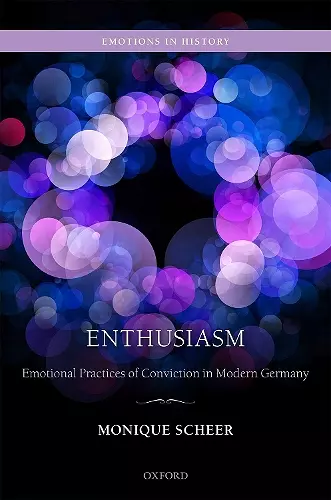Enthusiasm
Emotional Practices of Conviction in Modern Germany
Format:Hardback
Publisher:Oxford University Press
Published:29th Oct '20
Currently unavailable, and unfortunately no date known when it will be back

Enthusiasm seeks to contribute to a culturally and historically nuanced understanding of how emotions secure and ratify the truth of convictions. More than just pure affective intensity, enthusiasm is about something: a certainty, clarity, or truth. Neither as clearly negative as fanaticism nor as general as passion, enthusiasm specifically entails belief. For this reason, the book takes its starting point in religion, the social arena in which the concept was first debated and to which the term still gestures. Empirically based in modern German Protestantism, where religious emotion is intensely cultivated but also subject to vigorous scrutiny, it combines historical and ethnographic methods to show how enthusiasm has been negotiated and honed as a practice in Protestant denominations ranging from liberal to charismatic. The nexus of religion and emotion and how it relates to central concepts of modernity such as rationality, knowledge, interiority, and sincerity are key to understanding why moderns are so ambivalent about enthusiasm. Grounded in practice theory, Enthusiasm assumes that emotions are not an affective state we 'have' but mind-body activations we 'do', having learned to perform them in culturally specific ways. When understood as an emotional practice, enthusiasm has different styles, inflected by historical traditions, social milieus, and knowledge (even ideologies) about emotions and how they work. Enthusiasm also provides insight into how this feeling works in secular humanism as well as in politics, and why it is so contested as a practice in any context.
I highly recommend this book not only to readers with a particular focus on emotions, religious studies and social sciences, but also to those who have a broader interest in the role of emotions in the wide field of cultural history, media studies and the arts. * Marie Louise Herzfeld-Schild, Philosophy, Theology and the Sciences *
In plain, beautiful prose Scheer cuts through much of the noise of recent theorizing about emotion in history to brilliantly demonstrate how taking enthusiasm as emotional practice clarifies analysis of both religious belief and unbelief. This is a rigorous, deeply sourced, and welcome provocation to the history of emotions and a major statement about the study of religion and emotion. * John Corrigan, Lucius Moody Bristol Distinguished Professor, Florida State University *
This book has much to teach us — about Protestant Christianity and feeling, yes, but also about bodies and practices, about modernity and enchantment, about politics and the nature of conviction. Scheer has produced a stunning, truly multidisciplinary study, poised to establish itself as a centerpiece of conversation in a broad range of humanistic fields. * Donovan Schaefer, University of Pennsylvania *
In this remarkable study, Monique Scheer bridges the gap between anthropology and history by combining archival research and field work to examine two centuries of emotional practices among German Protestants. Her treatment of emotion as "embodied thought" (Michelle Rosaldo's memorable term) and of enthusiasm as that which mediates between conviction and practice will be of great interest to a broad audience. Her grasp of a wide range of theoretical and philosophical literature is impressive. The revealing testimony of her informants is memorable. Every page is packed with insightful remarks. Readers will learn, for example, that charismatic and mainline Protestants have more in common than they think, and that many atheists, for that matter, rely on a similar framework of self-understanding. * William M. Reddy, William T. Laprade Professor Emeritus of History, Duke University *
In addition to being written with both clarity and mastery, Monique Scheer's Enthusiasm makes an important intervention that calls us to think about the naturalized status of German theory in the study of religion. Scheer doesn't just take Kant's or Schleiermacher's or Weber's word for it. Instead, she shows how the long German tradition of thinking about religion and emotion together has shaped the study of religion as a discipline, as well as the things and the people that we study as religion or religious. Read this book! * Pamela E. Klassen, Professor of the Study of Religion, University of Toronto, and author of The Story of Radio Mind: A Missionary's Journey on Indigenous Land *
This amazing book offers a fresh historical-ethnographic exploration of the emotional styles deployed in the Protestant spectrum and their — barely realized — embodied sediments in secular emotional registers and sensibilities in Germany. This insightful analysis of Protestantism's role in shaping how people "do" emotions is of major interest not only for scholars of religion, but for anyone seeking to understand the power of emotional styles in mobilizing people. Deploying "enthusiasm" as a productive concept to analyse how people become dedicated to a cause and convinced of a sense of truth, Monique Scheer opens up new vistas for the scholarship on religion and emotion beyond the secular-religious divide. Wow! * Birgit Meyer, Department of Philosophy and Religious Studies, Utrecht University *
ISBN: 9780198863595
Dimensions: 241mm x 164mm x 19mm
Weight: 540g
256 pages